

7 Things Teachers Say to Create a Supportive Classroom. There’s no way for a teacher to get through a whole school year without blurting out the wrong thing a few times.
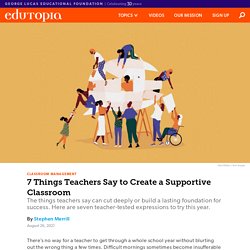
Difficult mornings sometimes become insufferable afternoons, and kids of all ages know how to press adults’ buttons. When you do slip up, extend yourself some grace. The good news? You can prepare to be supportive, and even practice before you step into the classroom. “One of the hardest things I had to do was learn how to change my ‘teacher’ language so that I could encourage and empower students on a daily basis,” confides sixth-grade teacher Alyssa Nucaro.
For professor of English education and former elementary and secondary teacher Todd Finley, being mindful about supportive language means surveying students about how they like to receive praise. Being intentional and reflective about the way you deploy language is the key. 7 Phrases to Keep in Mind for Regular Use. Kelly McGonigal: How to make stress your friend. Jo Boaler: ‘We need a revolution in how we think about maths’ Jo Boaler, professor of mathematics education at Stanford University, has big ambitions – she’s on a mission to transform maths education.
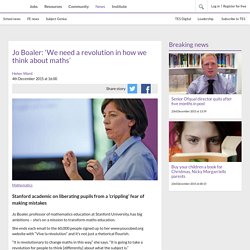
She ends each email to the 60,000 people signed up to her www.youcubed.org website with “Vive la révolution” and it’s not just a rhetorical flourish. “It is revolutionary to change maths in this way,” she says. “It is going to take a revolution for people to think [differently] about what the subject is.” She begins by pointing out that many children think that maths is a subject in which all the answers are right or wrong. And they are wrong. In her book Mathematical Mindsets, she argues that there should be less testing in maths, less worrying about failure, more use of visual representations and “manipulatives” (items such as blocks and cubes that students can handle) and more emphasis on group work to solve complex problems.
Of course, there are right answers. Banning times tables. Research shows how children can enjoy and succeed in math, Stanford expert says. Stanford Report, December 17, 2015 Stanford Professor Jo Boaler says that research findings show how all students can learn to enjoy math and achieve at high levels without suffering from fear or failure.
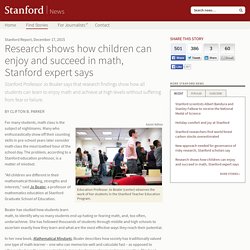
By Clifton B. Parker Aaron Kehoe Education Professor Jo Boaler (center) observes the work of her students in the Stanford Teacher Education Program. Math Can Be For All - Carnegie Foundation for the Advancement of Teaching. Students’ beliefs and mindsets about mathematics are major factors in determining students’ success in math.
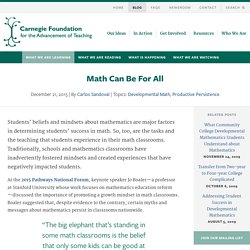
So, too, are the tasks and the teaching that students experience in their math classrooms. Traditionally, schools and mathematics classrooms have inadvertently fostered mindsets and created experiences that have negatively impacted students. At the 2015 Pathways National Forum, keynote speaker Jo Boaler—a professor at Stanford University whose work focuses on mathematics education reform—discussed the importance of promoting a growth mindset in math classrooms. Boaler suggested that, despite evidence to the contrary, certain myths and messages about mathematics persist in classrooms nationwide. Growth mindset guru Carol Dweck says teachers and parents often use her research incorrectly. Stanford psychology professor Carol Dweck has become something of a cult figure in education and parenting circles.
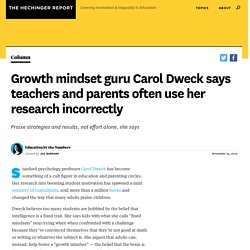
Her research into boosting student motivation has spawned a mini industry of consultants, sold more than a million books and changed the way that many adults praise children. Dweck believes too many students are hobbled by the belief that intelligence is a fixed trait. She says kids with what she calls “fixed mindsets” stop trying when when confronted with a challenge because they’ve convinced themselves that they’re not good at math or writing or whatever the subject is.
She argues that adults can, instead, help foster a “growth mindset” — the belief that the brain is like a muscle that can grow stronger through hard work. Dweck theorizes that parents’ well-intentioned praise contributes to the formation of unproductive fixed-mindset thoughts. But how to praise your kids properly is, apparently, quite complicated. Praising effort alone “It’s like the consolation prize. 10 Ways Well-Meaning White Teachers Bring Racism Into Our Schools. You Can Grow Your Intelligence. Many people think of the brain as a mystery.
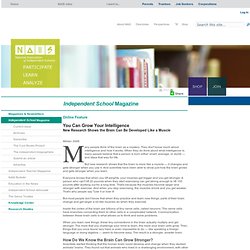
They don't know much about intelligence and how it works. When they do think about what intelligence is, many people believe that a person is born either smart, average, or dumb — and stays that way for life. But new research shows that the brain is more like a muscle — it changes and gets stronger when you use it. And scientists have been able to show just how the brain grows and gets stronger when you learn. Everyone knows that when you lift weights, your muscles get bigger and you get stronger. But most people don't know that when they practice and learn new things, parts of their brain change and get larger a lot like muscles do when they exercise. Inside the cortex of the brain are billions of tiny nerve cells, called neurons. When you learn new things, these tiny connections in the brain actually multiply and get stronger.
How Do We Know the Brain Can Grow Stronger? The Key to Growing the Brain: Practice? What Can You Do to Get Smarter? California Acceleration Project. Cap.3csn.org/files/2012/02/Attending-to-the-Affective-Domain-outline-v21.pdf. Brainology. Carol S.
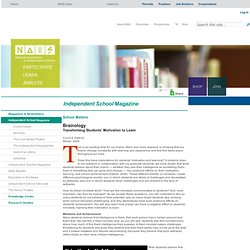
Accelerated English & Math Students on Carol Dweck’s “Mindsets”